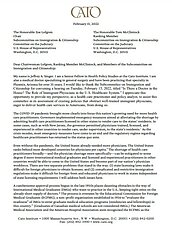Dear Chairwoman Lofgren, Ranking Member McClintock, and Members of the Subcommittee on Immigration and Citizenship:
My name is Jeffrey A. Singer. I am a Senior Fellow in Health Policy Studies at the Cato Institute. I am also a medical doctor specializing in general surgery and have been practicing that specialty in Phoenix, Arizona for over 35 years. I would like to thank the Subcommittee on Immigration and Citizenship for convening a hearing on Tuesday, February 15, 2022, titled “Is There a Doctor in the House? The Role of Immigrant Physicians in the U.S. Healthcare System.” I appreciate this opportunity to provide my perspective, as a health care practitioner and policy analyst, to assist this committee in its assessment of existing policies that obstruct well-trained immigrant physicians, eager to deliver health care services to Americans, from doing so.
The COVID-19 pandemic brought more clearly into focus this nation’s growing need for more health care practitioners. Governors implemented emergency measures aimed at alleviating the shortage by admitting health care practitioners licensed in other states to render care to the states’ residents. In some cases, such as with New Jersey, the governor permitted physicians trained, licensed, and experienced in other countries to render care, under supervision, to the state’s residents. As the crisis recedes, most emergency measures have come to an end and the regulatory regime regarding healthcare practitioners has returned to the status quo ante.
Even without the pandemic, the United States already needed more physicians. The United States ranks behind most developed countries for physicians per capita. The shortage of health care practitioners broadly—and the physician shortage more specifically—can be mitigated to some degree if more international medical graduates and licensed and experienced practitioners in other countries would be able to come to the United States and become part of our nation’s physician workforce. There are two separate problems that stand in the way: (1) state licensing laws make it difficult for foreign physicians to obtain licenses; and (2) complicated and restrictive immigration regulations make it difficult for foreign-born and educated physicians to work in states independent of state licensing requirements. I will address both issues here.
A cumbersome approval process begun in the late 1950s places daunting obstacles in the way of International Medical Graduates (IMGs) who want to practice in the U.S., keeping tight reins on the already short supply of doctors. The process is overseen by the Educational Commission for Foreign Medical Graduates (ECFMG), a non-profit organization established in 1956 to “evaluate the readiness” of IMGs to enter graduate medical education programs (residencies and fellowships) in this country.iv (Graduates of Canadian medical schools are not considered IMGs.) The American Medical Association and the American Hospital Association soon recognized the ECFMG as the standard for evaluating IMGs entering the U.S. healthcare system and serving patients in hospitals. The ECFMG obtained responsibility for visa sponsorship of Exchange Visitor physicians (J‑1 visas).

This work is licensed under a Creative Commons Attribution-NonCommercial-ShareAlike 4.0 International License.

